August 23, 2013 – Sometimes people read too much into a movie and see things that really aren’t there. But other times, they may be right. And so today’s theme is: “How Star Wars became an allegory about war and politics, and how its new owners might have to tread carefully in the future.” But first, a little history.
Few realize that the original Star Wars movie (1977) was an allegory about America and the Vietnam War. “Come again?!”, you say? In 2005, George Lucas revealed that Star Wars “was really about the Vietnam War….” He first conceptualized a Flash Gordon-inspired space saga in 1971 and began writing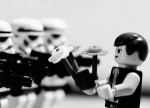 the script on April 17, 1973 at age 29, in the midst of the United States’ escalating conflict in southeast Asia. Recall that Lucas (born May 14, 1944) wore a black beard back then, a proud counter-culture badge of honor in a divided America that was rapidly changing. The passions and conflicts of his era informed his world view.
the script on April 17, 1973 at age 29, in the midst of the United States’ escalating conflict in southeast Asia. Recall that Lucas (born May 14, 1944) wore a black beard back then, a proud counter-culture badge of honor in a divided America that was rapidly changing. The passions and conflicts of his era informed his world view.
So is it a stretch to view Han Solo (played by Harrison Ford) as a guerrilla on the run — sort of a Vietcong minus the black pajamas? Or to find parallels between Grand Moff Tarkin (played by the late Peter Cushing, 1913-1994) with his planet destroyers and the unpopular General Westmoreland (or “waste more land”, as his critics called him)? Or to treat Darth Vader’s henchmen, the Imperial Stormtroopers, as the moral equivalent of “imperial capitalists”, a favorite epithet from a struggling land called Vietnam?
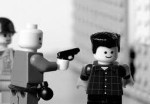 Perhaps it was inevitable that the conflict in Vietnam would spill over into the world’s most successful sci-fi franchise. Star Wars truly became an anti-Vietnam War allegory. And even though the movie did not premiere until May, 1977 (the United States had pulled out of the war before the fall of Saigon in 1975), Vietnam had already cast its long shadow and imprint on Lucas’s space fantasy.
Perhaps it was inevitable that the conflict in Vietnam would spill over into the world’s most successful sci-fi franchise. Star Wars truly became an anti-Vietnam War allegory. And even though the movie did not premiere until May, 1977 (the United States had pulled out of the war before the fall of Saigon in 1975), Vietnam had already cast its long shadow and imprint on Lucas’s space fantasy.
Twenty-eight years after Star Wars‘ release, Star Wars Episode III: Revenge of the Sith (2005) premiered. At that time, the United States found itself engaged in another highly controversial war, this time in Iraq. George Lucas said, “[T]he parallels between Vietnam and what we’re doing in Iraq now are unbelievable.”
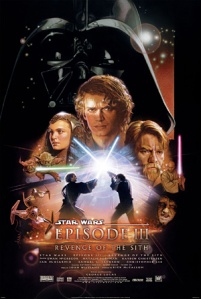 In a 2005 interview, Lucas said that Star Wars “was really about the Vietnam War, and that was the period where Nixon was trying to run for a [second] term, which got me to thinking historically about how do democracies get turned into dictatorships? Because the democracies aren’t overthrown; they’re given away.”
In a 2005 interview, Lucas said that Star Wars “was really about the Vietnam War, and that was the period where Nixon was trying to run for a [second] term, which got me to thinking historically about how do democracies get turned into dictatorships? Because the democracies aren’t overthrown; they’re given away.”
And so contemporary audiences watching the last of the six Star Wars films, Revenge of the Sith (2005), would not have missed these allusions to the War on Terror: As the Galactic Senate votes to grant “emergency” powers and to elevate Senator Palpatine to the position of Supreme Chancellor, Senator Padmé Amidala (played by Natalie Portman) quips, “This is how liberty dies: with thundering applause”. Few viewers missed the allusion to Bush’s intervention in Iraq and the curtailment of civil liberties under the U.S. Patriot Act. And when the twisted Anakin Skywalker (a young Darth Vader) declared near the end of Episode III, “You are either with me – or you are my enemy”, who could escape echoes of the voice of George Bush and his invocation of the Axis of Evil? Suddenly, American audiences had to confront an uncomfortable question: Despite America’s long cherished self-image as a guardian of freedom and champion of democracy, was the corrupt tyranny really our own? How could this have happened?
Conservative critics took umbrage and interpreted Episode III as a criticism of, and veiled attack against, former President George Bush and the Iraq War. Meanwhile, some diehard Star Wars fans simply shrugged their shoulders and pronounced Episode III to be a suitable redemption of the much-criticized Episodes I and II – while others found this last chapter to be the final nail in the coffin of an unsatisfactory prequel trilogy (1999-2005). Whatever happened to the glory days of Star Wars, fans bemoaned.
The Chicago Tribune wrote in 2005: “Lucas said he wrote … the screenplay’s … politically pointed elements before the Sept. 11, 2001, terrorist attacks and the subsequent war on terror. So when Palpatine announces that he intends to remain at war until a certain General Grievous is captured, no parallels to the hunt for Osama bin Laden or Saddam Hussein were intended.
“‘First of all we never thought of Bush ever becoming president,’ Star Wars producer Rick McCallum said, ‘or then 9/11, the Patriot Act, war, weapons of mass destruction. Then suddenly you realize, ‘Oh, my God, there’s something happening that looks like we’re almost prescient.'”
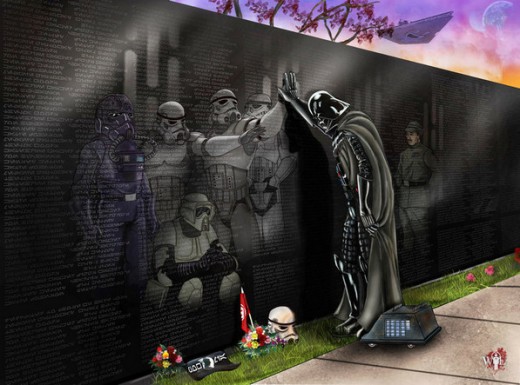
Controversial imagining of Darth Vader at the Vietnam Memorial.
Still other conservative voices have criticized Disney for its humanitarian (versus Christian) view that we are, essentially, one global village that can work together to solve mankind’s problems. Even Disney’s embrace of the environmental ethos ruffles feathers as being unnecessarily “anti-business” or “anti-capitalist”. (The irony is rich because Disney, by any measure, is a global capitalist conglomeration.)
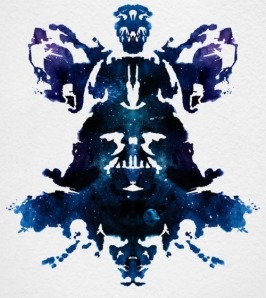
So how will Disney/Lucasfilm treat Star Wars’ sequel episodes, premiering in December 2015 and beyond? As virgin territory for more allegories? Or should we really view Star Wars on a more personal, individual level – as a mirror into how we view the world around us, a private Rorschach ink-blot test? Perhaps we over-analyze and over-complicate things? Because sometimes a blot really is just a blot, and that’s all you need to know.
Additional Reading
You might also enjoy the following articles:
● Joseph Campbell, George Lucas and the Power of Myth (29 Jan 2014)
● United Artists’ Rejection of Star Wars: Where Are They Now? (22 Aug 2014)

I have always noticed the parallels. The Ewoks were pretty much fluffy Vietcong as they were a less technically advanced nation that actually withheld the Empire. Plus much of their tactics, though short of punjis, was similar to those used by the Vietcong in Vietnam. Perhaps the rebel alliance are the Viet Minh.
Many people would be offended by the parralel in the USA, but most people in the UK and Europe in general supported the struggle of the Vietnamese people against foreign-backed dominance (and originally an intolerantly Christian minority). People have a right to determine their own fate whether we like the most popular form of politics there or not, with the exception of Fascist and the ideology of the Khmer Rouge (who the Vietnamese thankfully ousted with no help from the UK and the US!). As for the prequel trilogy, they were awful! But I could see that they were trying to philosophize on the state of politics at the time they were made, but they were a bit too heavy-handed and the fact it was almost all wall to wall action ruined it.
I utterly hated the Vietcong because of their communistic nature. And for the record, when we left Vietnam and, thanks to our congress and Nixon being ousted, backstabbed the South Vietnamese to leave them to their fate, it resulted in the creation of the Boat People, as well as the reeducation camps that left mass graves all over. You may think you were giving self-determination for the Vietnamese by supporting the Vietcong, but all you were doing was arming the USSR’s guns, since that’s EXACTLY who the Vietcong and the NVA were supported by, even BEFORE we got in. You want REAL self-determination, you should have allied with us, at least with us, we would have ensured Communism was driven out. And BTW, if we truly weren’t concerned with self determination, we would have freely let the French retain control of the colonies instead of ensuring that France stopped retaining any control over them.
And I have a very personal reason for my hatred of communism: Communism is the group that tried to slaughter us Christians just for our religion, or rather, just for the fact that we even HAVE a religion, and it was executions that were extremely brutal. Whenever I see a Vietnamese refugee who worked as a janitor who had various deformities from the Vietcong’s treatment of him, I know who I’ll root for, and it’s NOT the so-called “rebels” that the Vietcong are called. And I also had an uncle and a Catholic priest who can verify the atrocities against Christians.
You may want to back the Vietcong, more power to you, but I won’t, which is also why I’m more likely to support the Empire now (and for the record, I hate fascism as well, as it’s cut from the exact same cloth as Communism. In fact, I hate the French Revolution as well for the exact same reasons why I hate communism). Wish I could go back to the days where I rooted for the Rebels, but no longer, Lucas in his explicit confirmation that they were Vietcong members all but ensured I won’t ever go back.
Pingback: The Daily Censored » Star Wars fan? Lucas wrote a ‘false flag’-terrorism-war story of America devolving to dictatorship
Pingback: Star Wars: Lucas wrote a ‘false flag’ historical allegory about US devolution to rogue state empire. It’s true: US ‘leads’ ‘developed’ nations to war-poverty murder ~400 million in last 20 years as most evil government in world history -
Pingback: media - The Sullen Bell
Pingback: Was Earth invented for souls to learn about evil because a long time ago in a galaxy far, far away 10,000 super-powered Jedi Knights couldn’t recognize evil from just two Dark Side players and lost? Or was Star Wars invented to show how 300 million Amer
Pingback: Was Earth invented for souls to learn about evil because a long time ago in a galaxy far, far away 10,000 super-powered Jedi Knights couldn’t recognize evil from just two Dark Side players and lost? Or was Star Wars invented to show how 300 million Amer